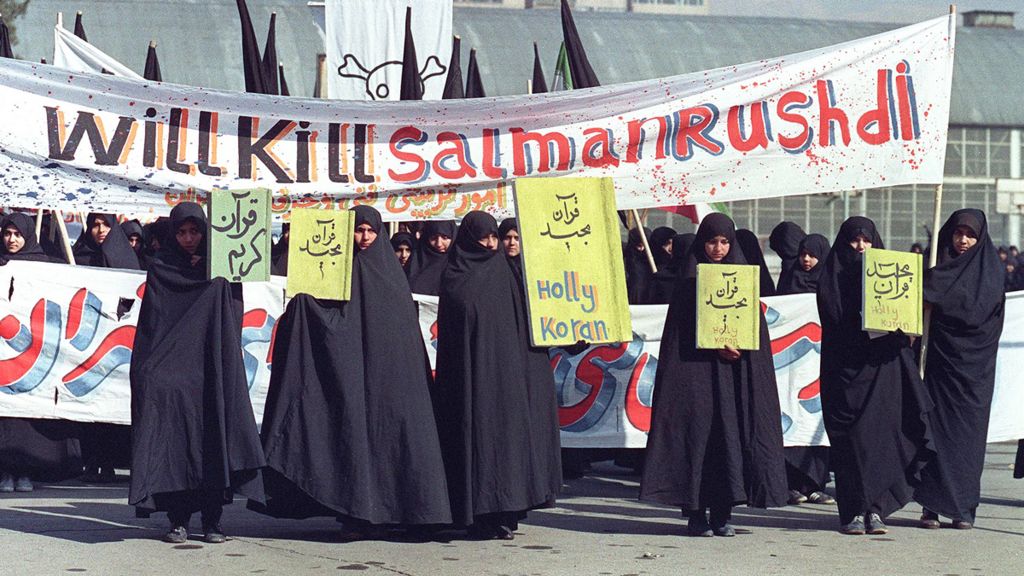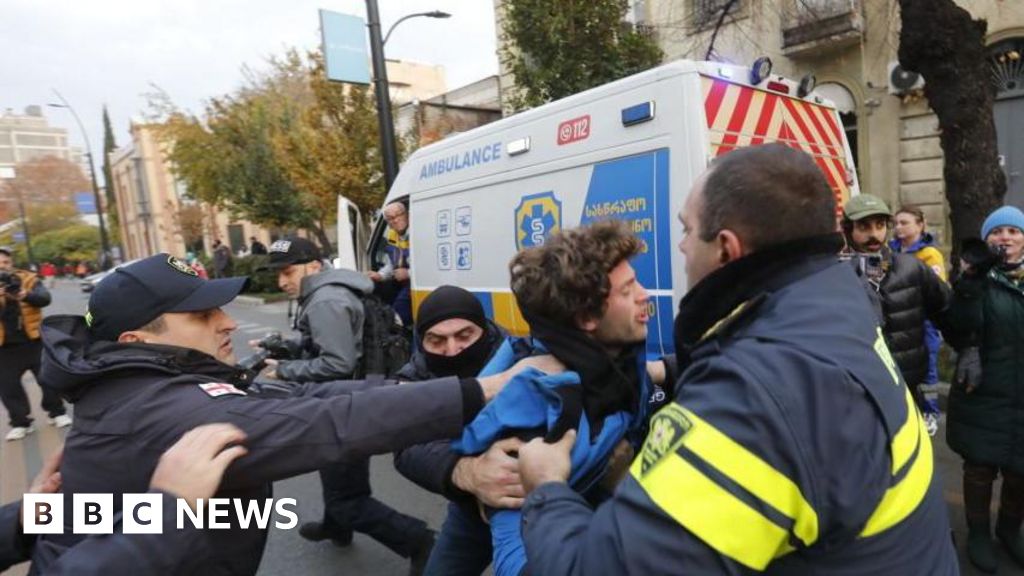ARTICLE AD BOX
By Chloe Hadjimatheou
BBC News
 Image source, Getty Images
Image source, Getty Images
A protest by women in Iran, three days after the fatwa against Salman Rushdie was issued by the country's leader
Sir Salman Rushdie remains in hospital in the US, a fortnight after suffering "life-changing" injuries in a stabbing in New York state.
The Satanic Verses author has faced death threats for more than 30 years, ever since Iran's Ayatollah Khomeini issued a fatwa - a formal proclamation by an Islamic legal scholar - calling for him to be killed.
Before the February 1989 decree, publicly at least, Iran had largely ignored the controversial book - but then, just hours before the fatwa was issued, a meeting took place at Tehran's main airport between two British imams and an Iranian government minister.
Bad weather closed in on the Iranian capital as Kalim Siddiqui and Ghayasuddin Siddiqui arrived at Mehrabad Airport. Both men had been attending a conference in Tehran to mark a decade since the country's Islamic Revolution. They were now trying to get home to the UK.
Inside the airport, they bumped into an Iranian government minister - Mohammad Khatami - who asked to have a private word with Kalim.
"They went to a corner and chatted," Ghayasuddin would later explain in the BBC's 2009 documentary, The Satanic Verses Affair.
When Kalim returned, he explained what they had spoken about. "He was asking my view about Salman Rushdie - and I told him, 'You know, something drastic has to happen,'" recounted Ghayasuddin.
Kalim told his travelling companion that the minister had been on his way to see Iran's then-Supreme Leader and top Shia Muslim religious authority, Grand Ayatollah Ruhollah Khomeini.
A few hours later, the ayatollah issued the fatwa.
Not only was it made against the Satanic Verses' author, but also its publishers, editors and translators.
"I call on all valiant Muslims wherever they may be in the world to kill them without delay, so that no one will dare insult the sacred beliefs of Muslims henceforth," it read.
Image source, Getty Images
Image caption,Sir Salman Rushdie was knighted in 2007
Sir Salman - who was knighted in 2007 - had published his controversial fourth novel in late 1988. The book's title refers to a disputed historical account in Islamic theology. The Prophet Muhammad is said to have been dictating two verses of the Koran, later abandoned because they were the result of deception by the devil.
Many Muslims argued Sir Salman's novel referenced Islamic theology and was a grave insult to their faith. They also objected, among other things, to characters depicting prostitutes being given the same names as wives of the Prophet.
For more than six months up until the fatwa, there had been protests across the world. The book had been banned in several countries including India - and demonstrations in Pakistan had left several people dead. In the UK, copies were burned in Bolton and Bradford.
But, until then, there had not been a huge public outcry from Iran's leaders. Had this airport meeting, later claimed by both Siddiquis to have been a chance encounter, secured the fatwa?
Image source, Getty Images
Image caption,Copies of the Satanic Verses were burned in Bolton and Bradford (pictured) before the fatwa was announced
Kalim and Ghayasuddin were not related, they just happened to have the same last name. Like Sir Salman, both were born in British-ruled India - before the 1947 Partition - and had settled in the UK. For several years in the late 1980s, the imams had been trying to forge closer ties with Ayatollah Khomeini's Islamic government.
Despite being a Sunni Muslim, Kalim admired what had happened in 1979 in Iran - a predominantly Shia Muslim country. He viewed the revolution as having freed Islam from Western domination by overthrowing the Western-backed Shah, Mohammad Reza Pahlavi.
Kalim later said he believed he may have been "partially responsible" for the fatwa.
"I met a minister, a cabinet minister at the airport. In the VIP lounge, he asked me about the Satanic Verses and about Rushdie. And I told him what I knew about it, and he went back to the imam [Ayatollah Khomeini], I suppose, I presume, and the fatwa followed later that morning."
"You feel proud of it?" asked journalist Ludovic Kennedy in 1992, during an interview for BBC Radio 4's Beyond Belief series.
The Iranian minister's approach to Kalim (pictured) "was the first time Dad knew about" a fatwa, says his son Iqbal
Journalist Yasmin Alibhai-Brown says Kalim also made the same claim to her around that time. She added: "Some of the ayatollahs hadn't even read the book".
Ed Husain, a writer on religion and extremism who used to be a close friend of Ghayasuddin, has also spoken of the significance of the airport meeting.
In 2019, he told the BBC's podcast series Fatwa that Ayatollah Khomeini had not been minded to do anything about Sir Salman Rushdie because he was just a "foreign author in another country".
It had been the British imam, said Mr Husain, who had pushed Iran's autocratic political and religious leader - urging that he "must do something for the Muslims".
He said it meant a British Muslim had approached "a fascist government asking for a theocratic leader to issue a fatwa on one of their citizens back in a free country".
When asked if he was saying the fatwa had been requested from the UK, Mr Husain replied, "yes".
However, there are accounts which play down Kalim's influence.
Image source, PA Media
Image caption,Ghayasuddin Siddiqui's family says he distanced himself from the fatwa decades ago
"Popular mythology" maintains Kalim as the "grand master of the fatwa, but this simply is not the case," states a biography of his travelling companion Ghayasuddin.
The book - A Very British Muslim Activist, as told by C Scott Jordan - says regular, abrupt and unscheduled meetings with ministers to discuss the week's hot topic "were part and parcel" of the Siddiquis' trips to Iran.
"This week, as the buzz would have it, it appeared that Salman Rushdie's book had wound up on the desk of Ayatollah Khomeini and, being the leader of the Islamic state, it was incumbent upon him to act."
The authorised biography says the minister, Mohammad Khatami - who would later become president - did ask Kalim's opinion, but says it is not known whether it was passed on to the ayatollah - or would have made any difference.
"To think a religious proclamation that had been carefully debated and reasoned by religious scholars had any influence from a foreign cheerleader in the few hours before its official release is nothing short of ridiculous," it says.
Image source, Getty Images
Image caption,Ayatollah Khomeini waves to supporters upon his return to Iran from exile in February 1979
Kalim died in 1996. Speaking after the recent attack on Sir Salman, Kalim's son, Iqbal, says it was pure coincidence that his father happened to be in Iran around the time the fatwa was issued.
The moment the Iranian minister approached him asking for background information "was the first time Dad knew about" a fatwa, he says. "He never felt any involvement or responsibility for the fact the fatwa came out."
But Iqbal also says his father never expressed any regret about supporting the proclamation.
British Muslims opposed to The Satanic Verses fell roughly into two camps when it first came out.
Firstly, there were those who fought the publication by calling for the UK legal system to change - extending the blasphemy law beyond Christianity to other faiths. They never got their way - instead the law was abolished in England and Wales in 2008, and in Scotland in 2021.
Then, there were those in the Siddiquis' camp - calling for something more fundamental from within Islam itself. Some men, who felt their views on the novel had not been listened to or respected by British society, began to present themselves as the legitimate representatives and gatekeepers of British Muslims.
Kalim was one of them. Late in 1989, he and his supporters noisily took over a meeting of several hundred Muslims in Manchester. The interruption came a day after the BBC had reported the result of a poll which had suggested only 35% of British Muslims supported the fatwa.
Kalim asked the audience if they agreed with the decree. "Practically all those present raised their hands," wrote Kalim later. " I had demonstrated, in the most dramatic fashion possible, the total unity and consensus that existed on this issue among Muslims in Britain."
For Kalim, Islamic institutions would better represent British Muslims.
He went on to launch a Muslim Parliament in 1992, which became a forum for debate and discussion. But it declined after his death and ceased in 1997. According to its former deputy leader, Jahangir Mohammed, Kalim set up the organisation on the back of the popularity he gained as a result of the fatwa.
But Yasmin Alibhai-Brown says Kalim made an "instinctive power grab" and did not represent ordinary Muslims. The Muslim Parliament was "a laughable thing", she says. "In what sense was it a parliament? It was a parliament without anybody voting."
Ghayasuddin is still alive, but not well enough to speak to the media. His son Asim - like Kalim's son, Iqbal - also says the Tehran airport encounter was a chance meeting and there is no evidence Kalim's views were passed on to Ayatollah Khomeini.
Asim says his father distanced himself from the fatwa decades ago - a sentiment echoed by Yasmin Alibhai-Brown. "[Ghayasuddin] changed his mind and became a real fighter for free speech, it was a really courageous thing to do," she says.
Image source, Getty Images
Image caption,Hadi Matar (pictured in mask) has not said whether his alleged attack on Sir Salman Rushdie was influenced by the fatwa
Whether or not Kalim was the reason for Ayatollah Khomeini's edict that day in 1989, we are unlikely to ever know for sure. There were other factors swirling around the upper echelons of the Iranian leadership at that time.
Many Iranian citizens were disillusioned as the promises of the revolution 10 years before had not been fulfilled, while the supreme leader himself was terminally ill and still bitter after reluctantly agreeing to end a brutal eight-year war with Saddam Hussain's Iraq. Some journalists speculated whether the fatwa may have provided a convenient distraction from the embarrassment of agreeing to a ceasefire with Baghdad.
After his death in June 1989, Ayatollah Khomeini's son told journalists his father had never read The Satanic Verses. His passing also meant the fatwa would be in place for eternity - as such a decree can only be reversed by the Islamic scholar who issued it.
In the late 1990s, Iran's government - led by President Khatami - backed away from the fatwa, declaring it would neither "support nor hinder" Salman Rushdie's assassination. But in 2017, the current Supreme Leader, Ayatollah Ali Khamenei - when asked if the fatwa was still binding - said: "The decree is as Imam Khomeini issued."
Dozens of people died in protests over the novel, while others - including the book's Japanese translator - were killed after the fatwa. Sir Salman was forced to remain in hiding for almost a decade.
Now, more than three decades later, he has suffered life-changing injuries in an attack at a public event in New York state in the US.
Iran has "categorically" denied any link with the alleged perpetrator, instead blaming the writer himself.
The young man accused of the stabbing - Hadi Matar, 24 - has not said whether his alleged actions were influenced by the fatwa.
He has reportedly said he has only read two pages of the Satanic Verses.

 2 years ago
15
2 years ago
15








 English (US)
English (US)